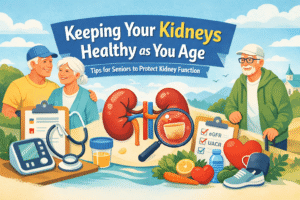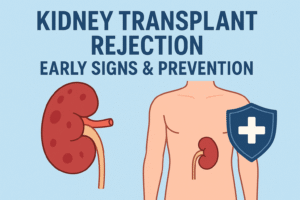Good nutrition has a critical role in managing kidney disease. When kidney function declines, diet can either shield the body from harm or worsen symptoms. Thoughtful food choices help slow progression, sustain energy, and reduce complications.
At Southern Oklahoma Kidney Center, every care plan includes personalized nutrition counseling. Below are simple, practical tips our team offers to support better kidney health.
Why Diet Matters in Kidney Disease
As the kidneys filter poorly, waste and excess fluid accumulate in the bloodstream. A careful diet can:
- lighten the kidneys workload
- stabilize blood pressure and blood sugar
- limit waste build-up
- boost strength and energy.
Our Kidney Disease & Diabetes page describes how balanced meals help diabetic patients control both illness at the same time, underscoring nutrition as a cornerstone of kidney care.*
1. Limit Sodium (Salt)
Excess sodium raises blood pressure, encourages fluid retention, and strains the heart and kidneys.
Tips to Cut Sodium
- Whenever possible, choose fresh or frozen vegetables in place of canned varieties.
- Prepare meals at home rather than relying on processed options or fast-food restaurants.
- Always read food labels and select products marked low-sodium or labeled no salt added.
- Season dishes with herbs and spices to create flavor without adding table salt.
- For a deeper understanding of sodiums effects on blood pressure and kidney health, visit the Hypertension and Kidney Disease page.
Watch Your Protein Intake
Protein is necessary for growth and repair, but excessive consumption forces kidneys to filter more waste.
- Aim for smaller portions of high-quality protein such as eggs, fish, or skinless chicken.
- Cut back on red meats and eliminate processed meat products whenever possible.
- Consult your physician or a registered dietitian to determine your ideal protein level.
- Patients on dialysis may require extra protein; the SouthernOKC care team will provide tailored recommendations.
Control Phosphorus
Elevated phosphorus can weaken bones and trigger itchy skin or joint discomfort, yet it hides in many processed foods and beverages.
Reducing Phosphorus
Many packaged foods contain hidden phosphorus, so focus instead on simple, fresh ingredients.
- Replace dark sodas, bottled snacks, and processed cheese with home-cooked meals.
- Reach for water or light-colored juices, since most bottled drinks add phosphorus.
- Elevated phosphorus can worsen anemia, making mindful eating doubly important.
Monitoring Potassium
Potassium is vital for muscles and nerves, yet imbalances can harm patients with impaired kidneys.
- If tests show high potassium, cut back on bananas, oranges, potatoes, and tomatoes.
- Favor apples, berries, grapes, green beans, and cooked low-potassium vegetables.
- Boiling vegetables in water leaches extra potassium; discard the cooking water.
- Look to lab results-and your Southern Oklahoma Kidney Center nephrologist-to guide these choices.
Hydration-by Stage
In early disease, drinking enough fluid helps kidneys flush waste; at dialysis or in late disease, each sip counts.
Tips for Fluid Balance:
- Sip Water Throughout the Day
- Suck on Ice Chips, Sugar-Free Candy, or Lemon Wedges
- Track Your Daily Fluid Intake
6. Avoid Processed Foods
Packaged foods are often loaded with hidden phosphorus, sodium, and preservatives. Try to:
- Cook with Fresh Ingredients
- Replace Instant Noodles, Deli Meats, and Frozen Meals
- Keep a Food Diary
Nutrition is more than just food—it is part of your treatment. At Southern OKC, your care team includes dietitians and kidney specialists who help you build a kidney-friendly eating plan that fits your lifestyle and medical needs.
If you or a loved one is living with kidney disease, schedule a visit with Southern Oklahoma Kidney Center and take the first step toward better health—one meal at a time.




